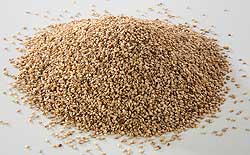Sesame Seeds Nutrition Facts

Sesame seeds are thought to be one of the oldest condiments, and so appealing that they became an integral part of the varied cuisines throughout India, Sumer, Egypt, and Anatolia, where they were cultivated. Historians believe the original homeland of the sesame seed is the Indian subcontinent. Britannica's 11th edition places its native soil in the Indian Archipelago, an area once called the Spice Islands.
Sesame seeds can add variety to your diet and give your health a boost. Not only are sesame seeds a very good source of manganese and copper, but they are also a good source of calcium, magnesium, iron, phosphorous, vitamin B1, zinc and dietary fiber. In addition to these important nutrients, sesame seeds contain two unique substances: sesamin and sesamolin. Both of these substances belong to a group of special beneficial fibers called lignans, and have been shown to have a cholesterol-lowering effect in humans, and to prevent high blood pressure and increase vitamin E supplies in animals. Sesamin has also been found to protect the liver from oxidative damage.
Sesame seeds are a very good source of copper, and calcium. Just a quarter-cup of sesame seeds supplies 74.0% of the daily value for copper, 31.6% of the daily value for magnesium, and 35.1% of the daily value for calcium.
Like most seeds and nuts, sesame seeds are high in calories, and should therefore not be eaten in great quantities.
|